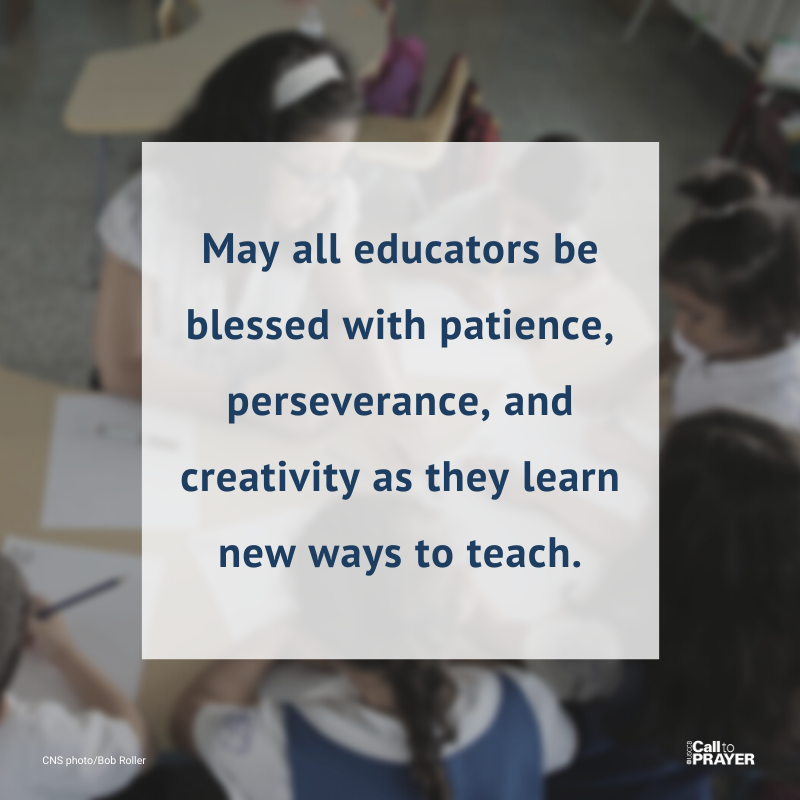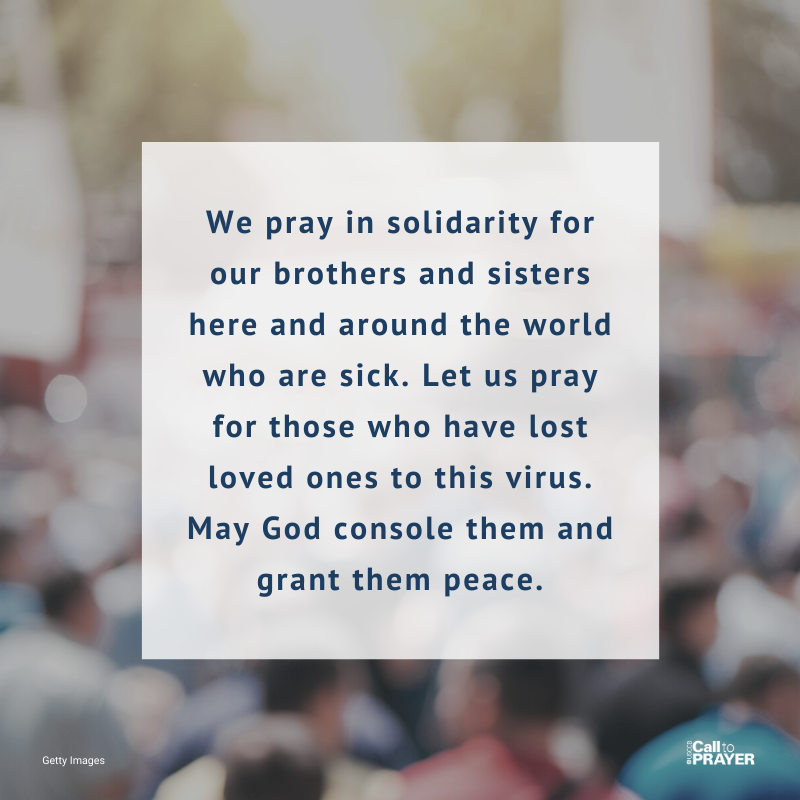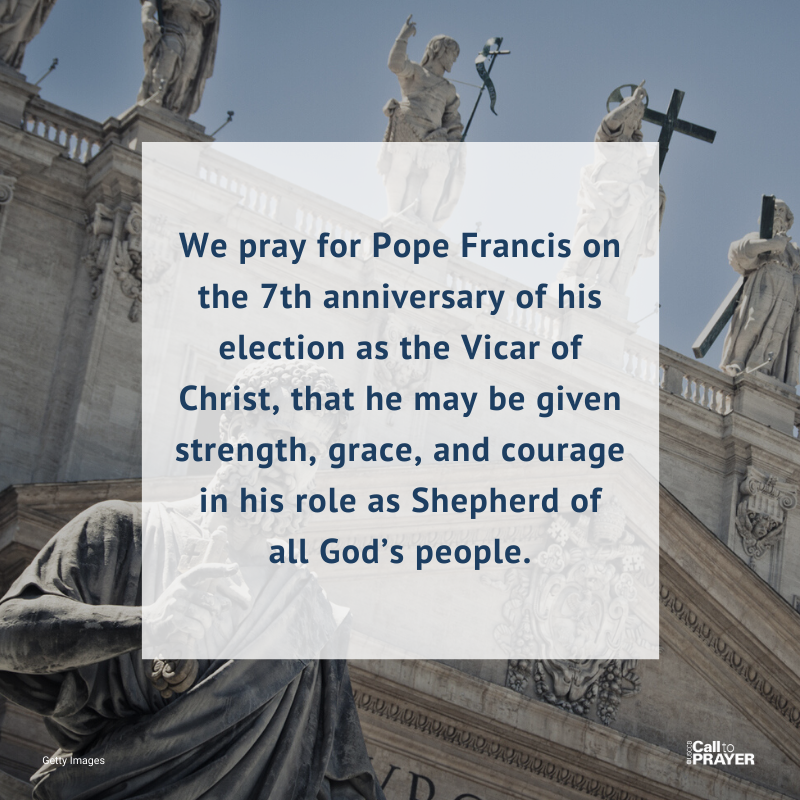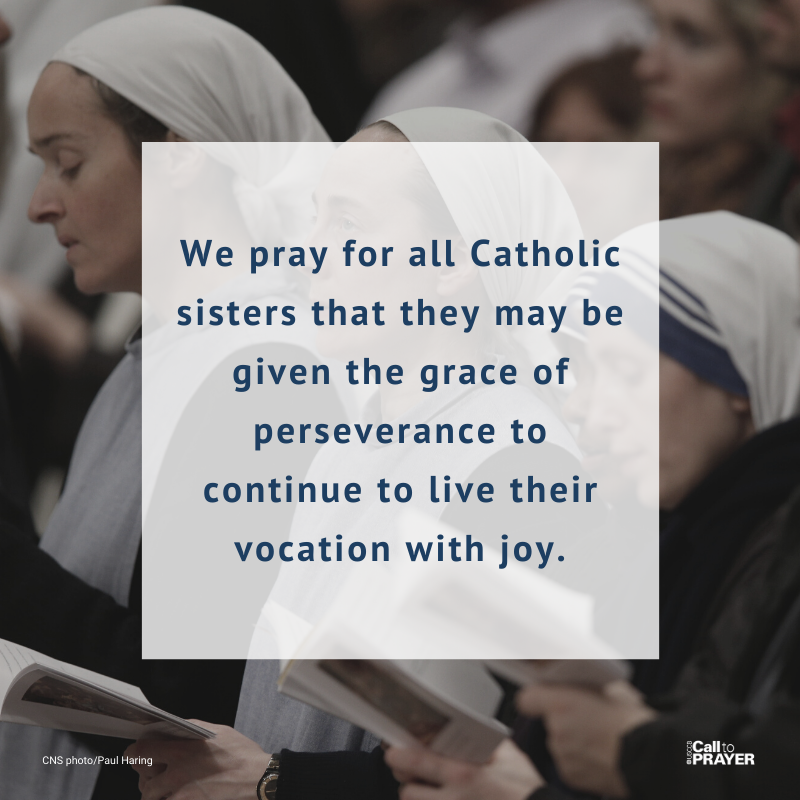Call to Prayer: March 27, 2020
Archive
Made for Love Minisode: Love on the Street
Hey y’all! I hope you are keeping safe, healthy, and… away from other people. It’s a great time to catch up on podcasts that you like, such as Made for Love!
Here’s a minisode about meeting Christ on the streets of New York City, with Kathryn Jean Lopez.
On Podbean:
And Soundcloud:
Archive
Call to Prayer: March 20, 2020
Archive
Made for Love Ep 57: Racism and the Family, Part Two
The primary place for education on human dignity is the family. Racism has no place in Catholic families. Today’s episode features Bishop Shelton Fabre of the Diocese of Houma-Thibodaux, Danielle Brown, Associate Director of the Ad Hoc Committee Against Racism at the USCCB, and Louis Damani Jones, intern with the Catholic Campaign for Human Development (CCHD).
More resources for parishes, children, and adults can be found at www.usccb.org/racism. Additionally, the bishops have collaborated to bring you this children’s book, called “Everyone Belongs” to help teach children, K-5th grade, to value reconciliation and the human dignity of every person.
The USCCB pastoral letter against racism is “Open Wide Our Hearts”
Here is some addition information about CCHD.
- The Catholic Campaign for Human Development (CCHD) is the national anti-poverty program of the U.S. Catholic Bishops. Thanks to the support of generous Catholics across the country, CCHD supports initiatives that help poor and vulnerable people defend their lives and dignity, make changes that solve local problems and improve their neighborhoods and communities.
- For nearly 50 years, CCHD has supported low-income led anti-poverty projects across the country. These initiatives include projects that empower new mothers, immigrants, the elderly, families, and individuals to be active participants in their lives and work with their community to transform our society into one which supports the flourishing of all our brothers and sisters.
- Louis is one of about 30 CCHD Interns serving across the country. These interns are a group of emerging leaders in the church committed to sharing the Good News of the Gospel through solidarity building, Catholic Social Teaching and developing relationships with community leaders.
On Podbean:
On Soundcloud:
Archive
Call to Prayer: March 13, 2020
Archive
The Nature of Marriage Blog: Chastity
 Chastity: The Married and the Single Person
Chastity: The Married and the Single Person
What is chastity? Some think that to be chaste means simply to abstain from sex or sexual behavior. This misunderstanding perhaps stems from the fact that we most often hear about chastity vis-à-vis our dating relationships, wherein practicing chastity means to restrain our sexual desires out of respect for our partner and out of respect for the gift of sexuality itself. Or, we might even have been led to be believe that sex in itself is wrong and dirty. However, while chastity certainly involves bodily restraint, chastity is much more than just bodily restraint, and chastity in no way supposes that sex is bad.
The Catechism of the Catholic Church teaches that Chastity is “the successful integration of sexuality within the person and thus the inner unity of man in his bodily and spiritual being” (CCC, 2337). The Catechism explains that chastity protects the powers of love and life (see CCC, 2338). In other words, the virtue of chastity helps us protect ourselves and others since it frees us to live our sexuality according to our state in life.
All people, whether they are single, dating, married, or consecrated (lay or religious), are called to a life of chastity. Married couples integrate their sexuality first by respecting themselves and God’s design for marriage. They live their individual gifts of sexuality by generously giving of themselves to each other as they vowed—faithfully, permanently, and open to life. Spouses protect the unitive and procreative nature of the conjugal embrace by keeping it whole and holy. That means that they reject contraception, sterilization, and abortion. When needed, chaste married couples use Natural Family Planning (NFP) to attempt to either achieve a pregnancy or postpone one. The chaste married couple mutually grows in their respect for each other, cherishes their gifts of sexuality and fertility, and never violate each other, their marriage, or God’s gifts. Chaste married couples reject anything that would harm these gifts adultery, contraception, abuse of any kind, including pornography.
Clearly, then, the virtue of chastity is not merely a prohibition against sex, or else married people would be called to a life of abstinence! Rather, chastity is the right ordering of our inherently sexual nature and the proper expression of sexuality in our everyday lives. But you might be thinking: What about unmarried people? What does it mean for single people to integrate their sexuality in life without engaging in sexual acts? Indeed, one might object that to integrate sexuality into one’s life without engaging in sexual acts presupposes the very definition of chastity that we are rejecting: if “integration” for single people just means “not being sexual,” then to be chaste must mean, simply, to abstain from sex.
However, this objection assumes that the terms “sexuality” and “sexual acts,” have the same meaning, limiting the scope of sexuality to mere genital expression. As Dr. Theresa Notare, the assistant director of the bishops’ NFP Program notes,
“Today’s culture insists that genital activity is the most important aspect of human sexuality. This view holds that people have a need to be satisfied genitally in whatever manner makes them happy….This utilitarian view of human sexuality and sexual relations sees human sexuality as limited to the genital and treats the sexual partner as nothing more than an object to be used. It offers a greatly diminished understanding of human nature.”
Put differently, we must not assume that to be sexual means to engage in sexual activity. All people belong to one sex or the other; all people are born male or female. To be a man or to be a woman is to live one’s sexuality. If we grant that our sex influences the way that we think, act, and relate to other people, then our biological sex is integral to the way we behave in our daily lives. If we consider that human beings are by nature social creatures that seek community with others, then we see that there is an inextricable link between how we fulfill this aspect of human nature with the fact that human beings are essentially gendered. In the context of our social nature, the biological reality of sex and procreation takes on a deeper meaning. Notare is helpful again on this point: “Within the context of human nature, pro-creation also speaks of our need to be in relation to each other–to build family, to have community. If we hope to live in a sexually mature way, our basic challenge in life is to integrate our sexual feelings with all other aspects of being human.”
This emphasis on the interpersonal aspect of human sexuality is what Karol Wojtyla deemed a personalistic approach rather than a sexological approach to sexual ethics. By personalistic sexuality, Wojtyla means that sexuality is, primarily, a term for the relation between the sexes; the conjugal act itself is understood in context of the former.[4] By contrast, the sexological approach to sexual ethics places the conjugal act at the heart and center: we understand human nature in terms of sex, not sex in terms of human nature. This personalistic expression of our sexuality is especially clear if we remember that the virtue of chastity should be understood in relation to theological virtue of charity or love. Love is not merely a sensual or psychological phenomenon whereby we desire another person insofar as they give us pleasure. Rather, love is willing the good of another and seeing them as a whole person in themselves, not as an object for us.
By understanding sexuality as, primarily, a social relation between people of the opposite sex, we can see how the single person’s sexuality is no less than the married person’s. It is tempting to think of marriage as the fulfillment or culmination of sexuality, that everyone’s sexuality is incomplete or lacking until it finds expression in the conjugal act. This is not true. It is especially important for the single person to realize that their sexuality is not diminished because they cannot have sex. The single person’s sexuality is not merely a diminished or immature form of married sexuality. Rather, the single person’s sexuality is good in itself because it is an expression of the more fundamental reality of sexuality: the interpersonal relation between men and women. Without downplaying the significance of the marital union, getting married and having sex is just one way of expressing this interpersonal relation.
For the single person, every time you treat someone of the opposite sex with kindness and respect—that is a chaste expression of your sexuality. Every time you express your unique, God-given strengths and gifts (especially in a way that benefits your community)—that is a chaste expression of your sexuality. Every time you thank God for your sex and revere the different but complementary aspects of men and women—that is a chaste expression of your sexuality.
[1] By “unmarried,” I mean dating or even engaged couples, as well as lay or religious people who have taken vows of celibacy. While the vow of celibacy is a unique way of expressing the call to chastity (in effect, one consecrates his/her life to a nuptial relationship with God), and while the celibate person practices chastity in an importantly different way from the single person who hopes to marry, the broader question with which I am concerned is: what does it mean to be a sexual person while abstaining from sex?
[2] Theresa Notare, “Sex and the Single Person,” United States Conference of Catholic Bishops, April 3, 1998, http://www.usccb.org/issues-and-action/human-life-and-dignity/abortion/sex-and-the-single-person.cfm)
[3] Notare, “Sex and the Single Person.”
[4] Karol Wojtyla, “The Problem of Catholic Sexual Ethics,” in Person and Community: Selected Essays, vol. 4 (Peter Lang, 1993), 282.
About the Author: Bridget Groff is an M.A./Ph.D. student in the School of Philosophy at the Catholic University of America. She currently works part-time at the United States Conference of Catholic Bishops as an intern for the Subcommittee for the Promotion and Defense of Marriage.
Archive
Made for Love Ep 56: Racism and the Family
The primary place for education on human dignity is the family. Racism has no place in Catholic families. Today’s episode features Bishop Shelton Fabre of the Diocese of Houma-Thibodaux, Danielle Brown, Associate Director of the Ad Hoc Committee Against Racism at the USCCB, and Louis Damani Jones, intern with the Catholic Campaign for Human Development (CCHD).
More resources for parishes, children, and adults can be found at www.usccb.org/racism. Additionally, the bishops have collaborated to bring you this children’s book, called “Everyone Belongs” to help teach children, K-5th grade, to value reconciliation and the human dignity of every person.
The USCCB pastoral letter against racism is “Open Wide Our Hearts”
Here is some addition information about CCHD.
- The Catholic Campaign for Human Development (CCHD) is the national anti-poverty program of the U.S. Catholic Bishops. Thanks to the support of generous Catholics across the country, CCHD supports initiatives that help poor and vulnerable people defend their lives and dignity, make changes that solve local problems and improve their neighborhoods and communities.
- For nearly 50 years, CCHD has supported low-income led anti-poverty projects across the country. These initiatives include projects that empower new mothers, immigrants, the elderly, families, and individuals to be active participants in their lives and work with their community to transform our society into one which supports the flourishing of all our brothers and sisters.
- Louis is one of about 30 CCHD Interns serving across the country. These interns are a group of emerging leaders in the church committed to sharing the Good News of the Gospel through solidarity building, Catholic Social Teaching and developing relationships with community leaders.
On Podbean:
Or Soundcloud:



